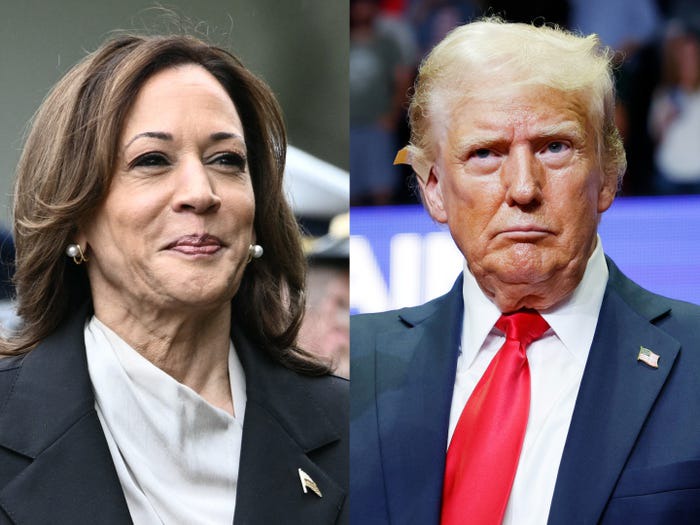Recent Poll Reveals Who Black Voters Prefer to Vote for Between Trump and Harris in Key States

Brendan Smialowski/AFP/Getty Images.
According to a report by Fox News on Sunday, August 18, 2024, Vice President Kamala Harris’ ascent to the top of the Democratic ticket has significantly re-energized Black voters in crucial swing states like Michigan and Pennsylvania.
The renewed enthusiasm among this demographic is seen as a key development in what is shaping up to be a highly competitive 2024 presidential race.
A recent Suffolk University/USA Today poll reveals that Harris now holds a commanding lead over former President Donald Trump among Black voters in these pivotal states. In Michigan, Harris leads Trump 70% to 9%, while in Pennsylvania, she holds a similar 70% to 11% advantage. These figures represent a significant improvement from earlier polls when President Joe Biden was still the Democratic nominee.
In June, a Suffolk University/USA Today poll showed that Biden led Trump by a narrower margin of 54% to 15% among Black voters in Michigan and 56% to 11% in Pennsylvania. The substantial increase in support for Harris suggests that her presence at the top of the ticket has reinvigorated a crucial voter base that Democrats have historically relied upon to secure victories in swing states.
The poll results underscore the importance of the Black vote in the upcoming election, particularly in states like Michigan and Pennsylvania, which were key battlegrounds in the 2020 election. In that race, Black voter turnout was instrumental in delivering narrow victories for Biden in both states. With Harris now leading the ticket, it appears that the Democratic Party is once again energizing this vital constituency.
Harris, who made history as the first woman and first person of color to serve as vice president, has consistently emphasized issues that resonate with Black voters, including racial justice, voting rights, and economic equality.
Her background as a former prosecutor and her record on civil rights have helped her connect with Black communities across the country, and her presence on the ticket seems to be galvanizing voters who were previously less enthusiastic.
The poll’s findings also indicate that Harris has been successful in addressing some of the concerns that Black voters had about the Biden administration. While Biden enjoyed strong support from Black voters in 2020, there was some disillusionment with the pace of progress on key issues such as police reform and economic equity. Harris’ candidacy appears to be rekindling the hope that meaningful change is still possible.
For the Trump campaign, these numbers present a significant challenge. Trump has struggled to make inroads with Black voters, despite efforts to appeal to this demographic through initiatives such as criminal justice reform and economic empowerment zones.
The wide gap in support between Trump and Harris among Black voters could prove decisive in states like Michigan and Pennsylvania, where even small shifts in voter turnout can tip the balance in a close election.
The Harris campaign is likely to seize on these poll results as evidence that their strategy is working and that they have momentum heading into the final stretch of the campaign. However, political analysts caution that there is still a long way to go before the election, and much could change between now and November. Both campaigns will need to continue working to engage and mobilize voters, particularly in swing states where the outcome is expected to be close.
As the first Black woman to lead a major party’s presidential ticket, Harris faces the unique challenge of meeting high expectations while also contending with the intense scrutiny that comes with being a historic candidate. So far, it appears that her candidacy is resonating with Black voters in key states, but the ultimate test will come on Election Day when those voters head to the polls.
The renewed enthusiasm among Black voters could play a pivotal role in determining the outcome of the 2024 election, making Harris’ ability to connect with this constituency a critical factor in the Democratic Party’s electoral strategy.





